'The only Black one left:' Alberta village remembers its African-American roots
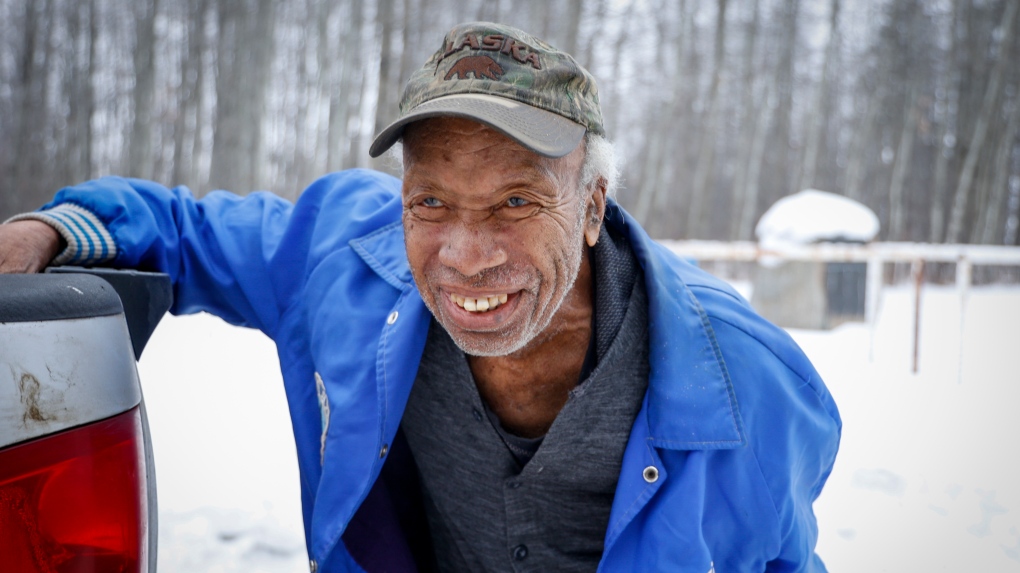 Vant Hayes, 88, visits a cemetery in Breton, Alta., on Monday, Jan. 16, 2023. Originally called Keystone, which was established in 1909 by a group of African-American immigrants. The new Black Canadian homesteaders arrived from Oklahoma, Kansas, and Texas, just four years after Alberta became a province in 1905. THE CANADIAN PRESS/Jeff McIntosh
Vant Hayes, 88, visits a cemetery in Breton, Alta., on Monday, Jan. 16, 2023. Originally called Keystone, which was established in 1909 by a group of African-American immigrants. The new Black Canadian homesteaders arrived from Oklahoma, Kansas, and Texas, just four years after Alberta became a province in 1905. THE CANADIAN PRESS/Jeff McIntosh
"My name is Vant Hayes and I'm the only Black one left out here."
Hayes, who says he's 88 years old or "somewhere around there," represents the end of an era in the village of Breton, 110 kilometres southwest of Edmonton.
His grandparents William and Mollie Hayes and their children moved to the area from Oklahoma in the early 1900s as part of the Great Migration of Black settlers from the United States, lured by the promise of free land and a better life.
An increase in discrimination in the southern U.S. in the early 1900s led to an exodus of African Americans to four tiny communities in Alberta. Breton, originally known as Keystone, was one.
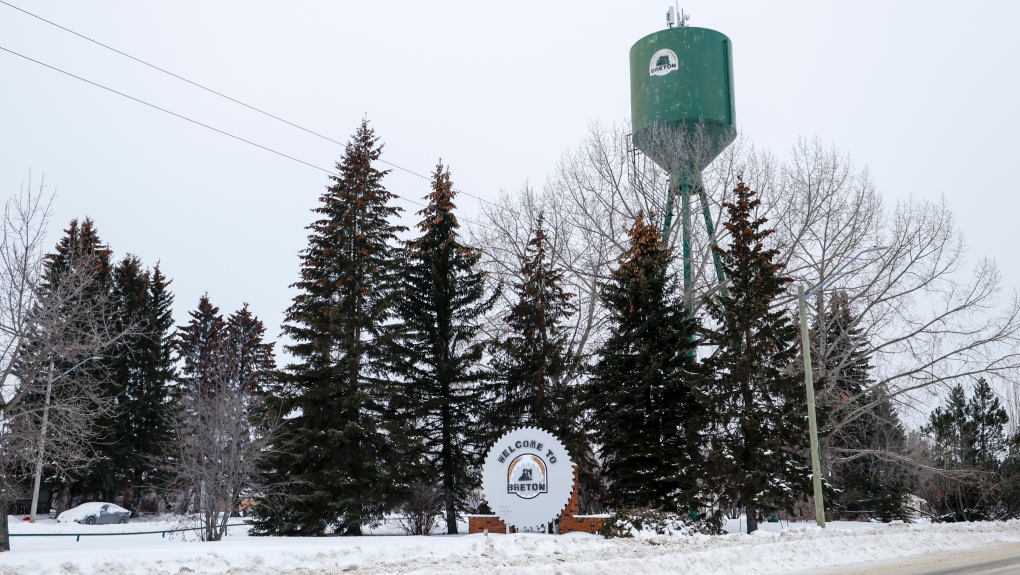 Breton, Alta., pictured on Monday, Jan. 16, 2023, was originally called Keystone, and was established in 1909 by a group of African-American immigrants. The new Black Canadian homesteaders arrived from Oklahoma, Kansas, and Texas, just four years after Alberta became a province in 1905. THE CANADIAN PRESS/Jeff McIntosh
Breton, Alta., pictured on Monday, Jan. 16, 2023, was originally called Keystone, and was established in 1909 by a group of African-American immigrants. The new Black Canadian homesteaders arrived from Oklahoma, Kansas, and Texas, just four years after Alberta became a province in 1905. THE CANADIAN PRESS/Jeff McIntosh
Most of the descendants of the original 54 families have moved on, but Hayes remains.
"You would get a quarter (section), but you had to clear 10 acres on it before you could get the title. I guess that was one reason they migrated here. Another one was in the States. It was bad down there," he said.
The migration hit its peak between 1909 to 1911. A federal order-in-council in 1911 barred Black people from Canada because they were "deemed unsuitable to the climate and requirements" of the country, but it was repealed later that year.
Hayes' parents, Floyd and Elizabeth, moved their 10 children briefly to Kelowna, B.C., to find work, but returned to the homestead after the father died.
"It was tough. You try and look after 10 kids. You gotta figure out how you're going to feed them today and the next day and we made it through," Hayes said.
"We ate a lot of eggs … a lot of chicken too," he added with a laugh.
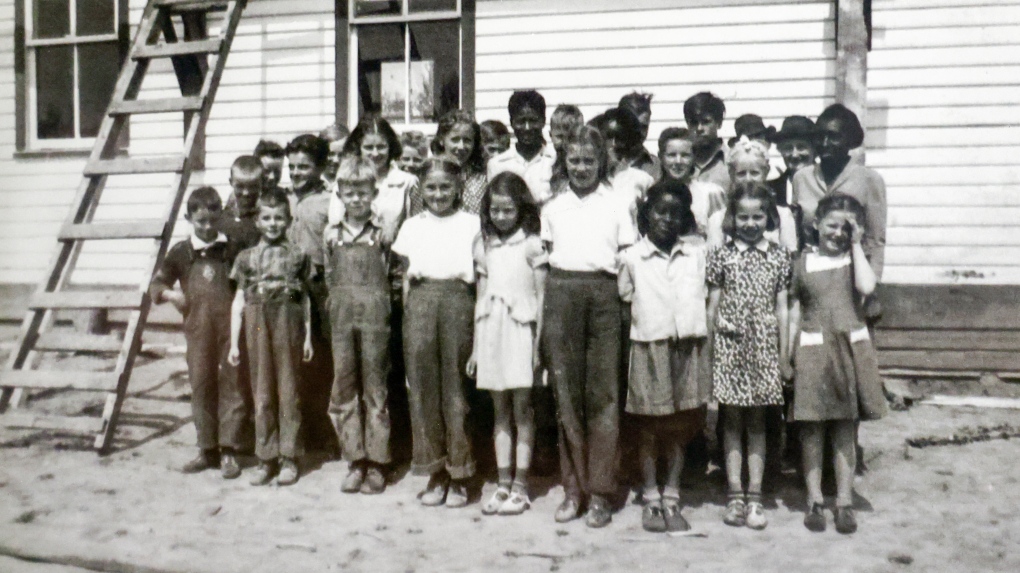 Students of the Funnell School are pictured in 1943 in a photo on display at the Breton Museum. Breton, Ata., originally called Keystone, and was established in 1909 by a group of African-American immigrants. The new Black Canadian homesteaders arrived from Oklahoma, Kansas, and Texas, just four years after Alberta became a province in 1905. THE CANADIAN PRESS/HO-Breton Museum
Students of the Funnell School are pictured in 1943 in a photo on display at the Breton Museum. Breton, Ata., originally called Keystone, and was established in 1909 by a group of African-American immigrants. The new Black Canadian homesteaders arrived from Oklahoma, Kansas, and Texas, just four years after Alberta became a province in 1905. THE CANADIAN PRESS/HO-Breton Museum
But Hayes said despite the new surroundings, his mother never got over the treatment she received in Oklahoma.
"A lot of people had moved up from the States and they figured this was the same as the States. My mother always carried a .43 Mauser rifle in the wagon with her. It was just for protection," said Hayes.
"One guy came riding up on this big horse and he started yelling at her and calling her names. She came back with this big .43 Mauser and said: 'If you don't get out of my yard right now, I'm going to shoot the horse and when you're running I'm going to shoot you, too.'
"After that, he was real nice," he added with a chuckle.
Hayes spent years working on oil rigs but always came back to the farm. He hopes one of his granddaughters will carry on the family legacy.
He's worried about the local history disappearing when he dies.
"You're not going to have this Black history," he said. "It's not going to go on forever."
Brandy Fredrickson's great, great grandparents Sam and Neoma Hooks moved with their four children from Sharpes, Okla., in 1911.
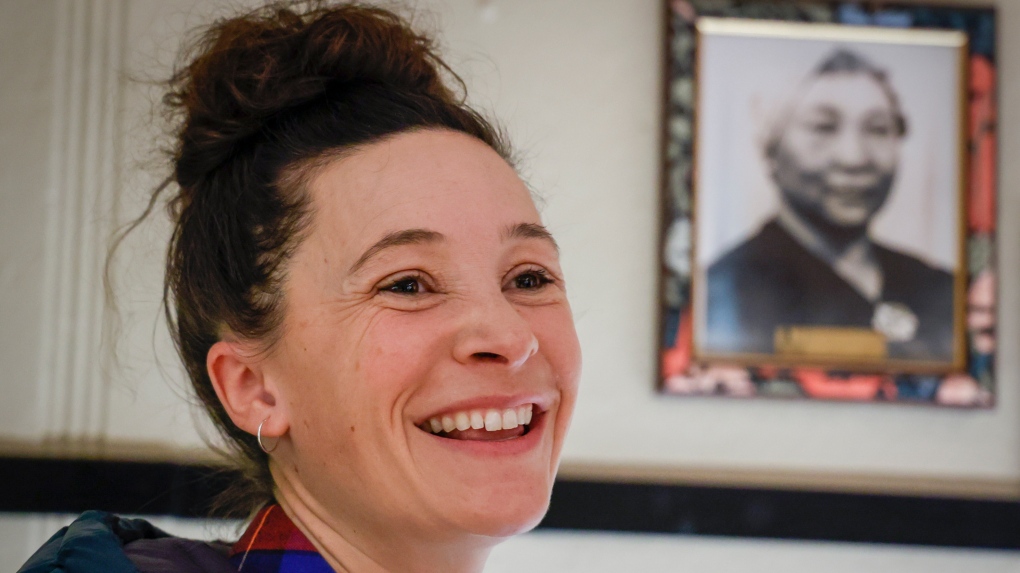 Brandy Fredrickson, with a photo of her ancestor Neoma Hooks at the Breton Museum, in Breton, Alta., Monday, Jan. 16, 2023. Breton was originally called Keystone, and was established in 1909 by a group of African-American immigrants. The new Black Canadian homesteaders arrived from Oklahoma, Kansas, and Texas, just four years after Alberta became a province in 1905. THE CANADIAN PRESS/Jeff McIntosh
Brandy Fredrickson, with a photo of her ancestor Neoma Hooks at the Breton Museum, in Breton, Alta., Monday, Jan. 16, 2023. Breton was originally called Keystone, and was established in 1909 by a group of African-American immigrants. The new Black Canadian homesteaders arrived from Oklahoma, Kansas, and Texas, just four years after Alberta became a province in 1905. THE CANADIAN PRESS/Jeff McIntosh
She said remembering the area's past is important because "you lose those shreds of history" as older people pass away.
"I know we're fifth and my kids are sixth generation," she said, wiping away tears. "To me, it's to know where they came from."
Allan Goddard, the curator of the Breton and District Historical Museum, grew up nearby but wasn't aware of the area's Black history.
He said some early homestead records had Black landowners' race specified as their nationality in the corner of the page, which was not the case for white ones.
"They were Americans. That was quite eye-opening to me," said Goddard. "Were they being identified to send them to a certain area or were they being identified just based on colour?”
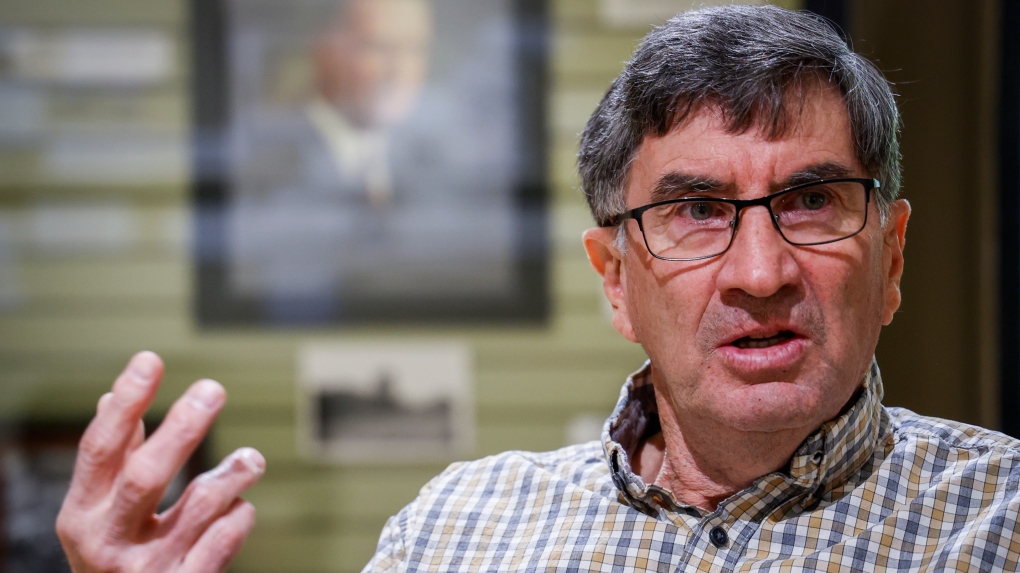 Allan Goddard, museum curator, speaks about Breton, Alberta, originally called Keystone, and was established in 1909 by a group of African-American immigrants, in Breton, Alta., Monday, Jan. 16, 2023. The new Black Canadian homesteaders arrived from Oklahoma, Kansas, and Texas, just four years after Alberta became a province in 1905. THE CANADIAN PRESS/Jeff McIntosh
Allan Goddard, museum curator, speaks about Breton, Alberta, originally called Keystone, and was established in 1909 by a group of African-American immigrants, in Breton, Alta., Monday, Jan. 16, 2023. The new Black Canadian homesteaders arrived from Oklahoma, Kansas, and Texas, just four years after Alberta became a province in 1905. THE CANADIAN PRESS/Jeff McIntosh
The community has Black History Month gatherings each year. The original cemetery was mostly forgotten but now a giant rock with a brass plaque pays tribute to the 27 people identified as being buried there.
Three tombstones were visible under a deep blanket of snow on a cold and foggy January day.
"Our apologies for those we have missed", reads the plaque.
Goddard said when the snow is gone, a few indentations where people may be buried are visible.
"I was asked quite a few years ago, about the residential schools and this ground penetrating radar stuff," Goddard said, referring to searches for possible unmarked graves being undertaken at many former residential school sites across Canada.
"That was probably pretty high-tech at that time and I said, 'well they're there, they're at peace," he said.
"Maybe we leave it at that."
This report by The Canadian Press was first published Feb. 8, 2023.
CTVNews.ca Top Stories

BREAKING Donald Trump picks former U.S. congressman Pete Hoekstra as ambassador to Canada
U.S. president-elect Donald Trump has nominated former diplomat and U.S. congressman Pete Hoekstra to be the American ambassador to Canada.
Genetic evidence backs up COVID-19 origin theory that pandemic started in seafood market
A group of researchers say they have more evidence to suggest the COVID-19 pandemic started in a Chinese seafood market where it spread from infected animals to humans. The evidence is laid out in a recent study published in Cell, a scientific journal, nearly five years after the first known COVID-19 outbreak.
This is how much money you need to make to buy a house in Canada's largest cities
The average salary needed to buy a home keeps inching down in cities across Canada, according to the latest data.
'My two daughters were sleeping': London Ont. family in shock after their home riddled with gunfire
A London father and son they’re shocked and confused after their home was riddled with bullets while young children were sleeping inside.
Smuggler arrested with 300 tarantulas strapped to his body
Police in Peru have arrested a man caught trying to leave the country with 320 tarantulas, 110 centipedes and nine bullet ants strapped to his body.
Boissonnault out of cabinet to 'focus on clearing the allegations,' Trudeau announces
Prime Minister Justin Trudeau has announced embattled minister Randy Boissonnault is out of cabinet.
Baby dies after being reported missing in midtown Toronto: police
A four-month-old baby is dead after what Toronto police are calling a “suspicious incident” at a Toronto Community Housing building in the city’s midtown area on Wednesday afternoon.
Sask. woman who refused to provide breath sample did not break the law, court finds
A Saskatchewan woman who refused to provide a breath sample after being stopped by police in Regina did not break the law – as the officer's request was deemed not lawful given the circumstances.
Parole board reverses decision and will allow families of Paul Bernardo's victims to attend upcoming parole hearing in person
The families of the victims of Paul Bernardo will be allowed to attend the serial killer’s upcoming parole hearing in person, the Parole Board of Canada (PBC) says.


































